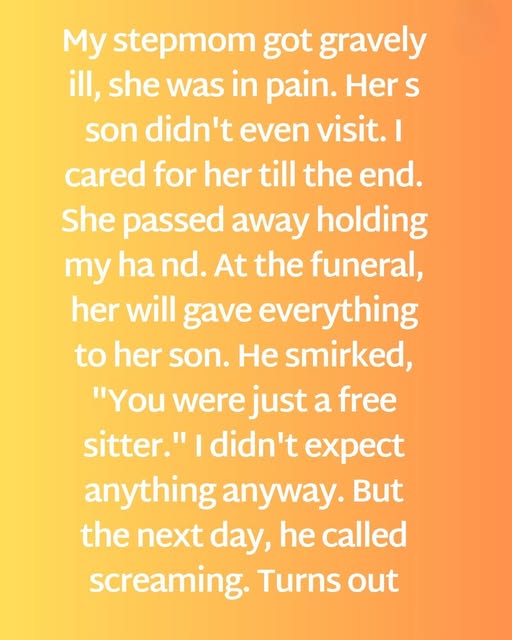He read parts of the letter aloud, his voice strained and uneven. She had written about her fear of becoming a burden, about her gratitude for the quiet moments we shared, and about how my presence made her feel less alone. She wrote that she wished she could change her will to acknowledge what our bond had meant to her, but she didn’t want to ignite conflict in her final days. The letter was her way of giving me something she felt she still owed—a truth spoken plainly, without expectation.
But that wasn’t the part that broke him.
In the same box, he had found old notes and receipts—fragments of plans she once had to open a small trust in his name. It was never completed. Not because she didn’t care about him, but because she had spent those last months obsessing over how to repair the growing distance between them. She thought about calling him more. She wrote reminders to invite him to dinner. She scribbled drafts of conversations she wanted to have, apologies she thought she owed, questions she was too afraid to ask.
She’d tried, in her own imperfect way, to find her way back to him.
Those unfinished plans hit him harder than the letter to me. He had expected money. He had expected some acknowledgment of his place in her life. But what he found was more painful: evidence of regret. Evidence that she had spent her last months longing for a closeness they’d let slip through their fingers.
It was easier for him to be angry at me—at my presence in those last days—than to face the truth she wrote in her own hand.
When he demanded answers, I didn’t raise my voice. I didn’t match his anger or defend myself. I told him what I knew: that the letter wasn’t meant to replace him. It wasn’t meant to divide anything. It wasn’t a statement about worth or inheritance. It was simply her last attempt to say thank you to someone who helped her carry the weight she didn’t want him to see.
I told him what I had seen firsthand: that she loved him deeply, even when she didn’t know how to show it. That she talked about him constantly. That she wished things were different. That she was proud of him, no matter how far apart life had pushed them.
There was nothing left in her estate that could be fought over. No savings. No property. No hidden accounts. All he had was a letter she wrote to me and a box full of the intentions she never acted on.
What she left him wasn’t money—it was clarity. Hard, heavy, inconvenient clarity.
He fell silent for a long time on the phone. The shouting stopped. The defensiveness drained out of his voice. He wasn’t angry anymore; he was grieving something deeper than death. He was grieving the time he didn’t take, the conversations he didn’t have, the space he let grow between them thinking there would always be more chances.
We all make that mistake once.
After the call, I sat alone in my kitchen with the quiet finally settling around me. I realized that the most valuable thing she had left me wasn’t the letter—it was the reminder that kindness matters, even when no one notices. That the moments we give people in their hardest days can shape their memory of themselves. And that sometimes the appreciation for those moments arrives in the form of a handwritten note discovered only after we’re gone.
A few days later, he reached out again. This time, he wasn’t yelling. He wasn’t defensive. He sounded tired, like someone who had been awake all night sorting through more than just cardboard boxes.
“I read the whole letter,” he said quietly. “I think she wanted me to understand something. And I think I didn’t, not until now.”
There was no accusation left in his voice. Only the ache of realization.
He asked if we could meet for coffee—not to rehash the past, but to try to understand each other better. To figure out, maybe, how to honor the person we both cared about in different ways.
We met at a small café she used to love. We talked about her laugh, her stubbornness, her habit of leaving handwritten notes around the house. We talked about the years that slipped through his fingers, and the ones I spent with her at the end. There was no bitterness between us, just two people rearranging the emotional debris left behind by someone they cared for.
Her letter didn’t divide us—it bridged something neither of us knew how to fix alone.
He apologized for how he acted. I accepted it. Not because I needed an apology, but because I understood the grief behind it. The kind that doesn’t show up neatly, the kind that lashes out before it softens.
By the time we parted, we agreed on one thing: her last gift wasn’t about gratitude or regret. It was about connection—messy, imperfect, overdue connection. And maybe, in a way, her final wish was that the two people who stood with her at different points in her life might find their way to understanding each other too.
Some inheritances come in envelopes. Others arrive in moments where truth finally surfaces.
Hers arrived in ink. His arrived in clarity. Mine arrived in peace.
And all of it, somehow, became enough.

